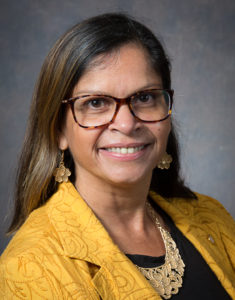
In 2016, Olga Negrón was elected to the Bethlehem city council. She came to the United States from Puerto Rico when she was 20 years old. (Courtesy of Olga Negrón)
It was a brisk winter morning on Three Kings Day in South Bethlehem when Olga Negrón went shopping. She was distracted by a boy misbehaving and overheard his mother warn that bad behavior results in no presents from the three kings that night. Negrón sighed — the three kings already came the previous night and left.
In this moment, Negrón realized that she not only had to educate her daughters about Hispanic culture, but also the entire community.
Olga Negrón was elected to the Bethlehem city council in 2016, much due to her strong connections with the Hispanic community on the South Side. She’s the only Latina on the city council representing the majority of Latinos who are voiceless.
“I like to fight for justice and I want to make sure that my people are well-educated about their rights, so they’re not being stepped on,” Negrón said describing her community outreach efforts and legal clinics.
Through her full-time occupation as a community liaison at HGSK Law Firm’s Social Service Department, Negrón either connects locals to resources they may need such as food stamps, food pantries or billing assistance, or acts as an interpreter for personal injury cases for the 85 percent of Latino clientele the firm attracts.
“If the Hispanic community all votes together, they’d be pretty powerful, and I think you’re starting to see that,” said Roger Hudak, Negrón’s longtime neighbor and friend. “(Negrón) has a lot to do with that.”
Being an employee in Allentown, Negrón had to sit in on many city council meetings, which sparked her curiosity about the Bethlehem city council. As her involvement and reputation also grew in the community with assisting in the Puerto Rican Parade and Borinquen Fest, leading to her membership in the Puerto Rican Cultural Coalition and the Puerto Rican Beneficial Society, many locals encouraged Negrón to run.
“She’s very active in the community, and she’s well-liked,” said Nicholas Englesson, a magisterial district judge and Negrón’s significant other.
Even with a lot of support, Negrón was doubtful whether she’d win, but the need for diversity reigned supreme.
“Too often the people from the community spoke against a project, and the council was not listening, they approved one and again projects and activities that the citizens did not want, so that’s when I said we need representation,” Negrón said.
While Negrón advocates for the rights of her community that she’s been a part of for 21 years, she has been the single voice of opposition on the city council. Rather than passing the building of the garage on New Street, the Martin Tower where playgrounds would be demolished or supporting zoning changes, Negrón fights for things such as the pedestrian bridge that community members want.
“Here’s what’s outstanding about (Negrón): she’s not a career politician. She doesn’t answer to the political bosses. She doesn’t answer to the money people. She doesn’t answer to the developers. She really represents regular folks — she sees that the other interests are well enough represented,” Englesson said.
Negrón understands her role of being the check and balance of the government structure and the voice of the community at large.
“I’m not there to have everybody like me, if I was I would’ve sold ice cream instead,” Negrón said, “I don’t make my own selfish decisions.”
Fellow Councilwoman Paige Van Wirt said while the votes before she was elected to office were often 6-1, tipping against Negrón, now she’s not the sole voice of opposition as they usually vote similarly.
“The fact that (Negrón) understands the South Side so much better than I do, I want to learn from her because if Olga has an opinion that’s different from me, there’s something there and I have to listen,” Van Wirt said.
Negrón is not removed from the communal struggle of South Bethlehem residents.
Just short of her 21st birthday, Negrón moved to Tallahassee, Florida, from Puerto Rico with her three-month-old baby and husband, eventually having two more daughters, and later getting divorced due to severe domestic violence. As a single mother, she moved to South Bethlehem where she had family. Here she noticed the need to educate the community about their Puerto Rican culture and where her long road to councilwoman began.
What the Hispanic community has, according to Negrón, is love and support for each other. As time goes on and the Hispanic community grows, representation will change and Latinos will be at the forefront.
“The Hispanic community just needs a little more time. All the leaders of the Hispanic community are women, (Negrón) is the woman,” Hudak said.
Both Hudak and Englesson said Negrón could push for any position in the future, even mayor. With the Hispanic community on her side and her yearning to represent the underrepresented, she’s as Hudak put it, “a dynamo.”





Comment policy
Comments posted to The Brown and White website are reviewed by a moderator before being approved. Incendiary speech or harassing language, including comments targeted at individuals, may be deemed unacceptable and not published. Spam and other soliciting will also be declined.
The Brown and White also reserves the right to not publish entirely anonymous comments.
3 Comments
I’m getting, actually have long been, irritated by the use of the word diversity. It’s a perfectly good word that In my opinion has been hijacked to promote an agenda. When you list Ms. Negron’s, forgive me for not knowing how to add the diacritical mark to her name, heritage and accomplishments I can see she brings something valuable to the table. I assume she was elected for her abilities and not her “diversity”.
““If the Hispanic community all votes together, they’d be pretty powerful”, “Negrón could push for any position in the future, even mayor. With the Hispanic community on her side and her yearning to represent the underrepresented, she’s as Hudak put it, “a dynamo.” Ms. Negron is providing representation for the Hispanic community which hopefully will benefit from her abilities. I’m sensing that South Bethlehem is more Hispanic than it was in the late 60’s (also more “Lehigh”). As I recall the area of Lehigh’s northward and eastward expansion was then populated by those of Eastern European heritage such as Mr. Hudak.
Oh, Robert.
The US is not the US you grew up and built your life in, and that gets truer the younger you go. For the youngest Americans, “white/European” is a large minority, not a majority. (My local school district in Iowa is 42% nonwhite — and the problem is now on the teacher side, because the teachers are mostly white, and the biases, they do manifest. In discipline as well as in the sense of “what is normal, who do we mean when we say ‘we’” that the teachers are putting out. South Bethlehem was heavily Latino by the 1980s.) Girls grow up expecting all the agency and rights that anyone else does. The middle-school kids are experimenting hard with the idea of gender, with more freedom than I’ve ever seen before, and with that experimentation any privilege that attached to being male is rapidly evaporating. You have to feel a little for the boys who’ve been brought up expecting royal treatment for being All-American sporty and crewcut: the world’s changing fast around them, and the things their dad and pawpaw told them just aren’t flying with their peers. I expect they’ll figure it out, though. They don’t have a lot of choice.
This idea of yours that people will be recognized by their abilities if they just show up and do their best has been shown to be bunk time and again. There are actual fields of study devoted to this question. Time and again, we find that there’s a steep gradient of privilege and favor that most strongly benefits white straight upper-middle-class Christian family men, even more so if they’re tall and goodlooking and not disabled in any visible way. Patience is not in order here; we’ve all been patient. Mighty, mighty patient.
I will say one thing about the “do your best” and “patience” tactics, though: they’ve backfired spectacularly. I think people assumed that women, for instance, would just never manage to live up to the baloney standards that got tossed at them, one after the next, for reasons why they weren’t succeeding — but they did. The result after decades of this is that we’re seeing women working harder, smarter, more collaboratively, and in more disciplined fashion than men are in the same fields, often while also bringing up children. (At which point certain parties start crying foul and claiming discrimination against men.) And there’s a point at which society at large just calls bull on the goalpost-moving game. I mean that’s the basis of that viral “BBC Mom” video from a few years ago after the hapless, and real, viral “BBC Dad” video went around.
It would be very nice if women and nonwhite men could show up on a council or a board or a department and be judged wholly on their abilities. But the reality is that this is unlikely to happen until the demographic leadership of those councils and boards and departments is actually and routinely representative of the population: representative of the types of diversity which seem to matter most when it comes to bias, and which — not coincidentally — seem to have been defined by the white Christian family men themselves, defined to say “not us”. It’s why in some countries, and indeed in some states, there are representation quotas on boards that matter: a minimum percentage of women, workers actually sitting on corporate boards, political balance.
I notice that you’ve had several posts that amount to “women and minorities don’t need to be represented in positions of power — they just need people [white men, presumably] who understand their needs.” In other words, don’t worry, little ______, we can take care of it for you. Why you would still believe this after a lifetime of demonstration that it isn’t so, and that in any case it doesn’t happen, I don’t know. But it’s not by any means a reasonable or adequate response.
I would invite you to take a hard look at the gap between the mildness of your tone and your earnestness about respect for others, on one hand, and the cruelty of the views you hold, on the other. An awful lot there seems to be clouded over by a certain blitheness and unwillingness to find out about or know how things are for people in the world. But you want women captive to reproductive biology, you want to deny the existence and effect of bias, you want women and nonwhites to be content to sit back and let the (white) men handle things, so long as those men hand out adequate kibble. And none of that falls under the heading of either respect or kindness.
I find at this point in this kind of argument, by the way, that many men will get to feeling a little snarly, and will come back with statistics or rhetoric purporting to show that women and minorities don’t really want (that kind of) respect, equality, equity, any such things, and hence the good auld days are best and respect human nature. I don’t think that’s generally your inclination. If it is today, though, understand that rhetoric is never a match for experience. And that in a nutshell is the problem with all rhetorical arguments, and why, slowly but surely, time and demographic shifts are sweeping them into the gutter.
In the Post today there’s a wonderful story about Claire McCardle, a 20th-c designer who revolutionized American women’s wear. Her dresses were a shock back then, and the men in charge of women’s fashion refused to believe they could do anything; today they’re known as “dresses”. Ordinary nice dresses. Everyone wears her designs. She knew what felt good and looked nice; she wasn’t interested in what men thought women ought to like, or what men liked on women, or in uncomfortable things like corsets and fitted bodices and all of that. And women went mad for her clothes. The only really significant advance I can think of since is Eileen Fisher’s designs, because Eileen understood that what’s really nice and comfortable, if you’re a woman with a woman’s body, is not a pencil skirt or something with a fitted waist, but pajamas and robes. And that you want these to be presentable if you’re going outside, made from nice fabrics, too. She is hands down the most popular designer of women’s wear amongst middle-aged and older women. Most of the comfortable-looking, cheaper officewear you see is a knockoff of some Eileen Fisher design or other. Just think: all those decades of men making fashion for women, and it took women to make the clothes that women actually want to wear. I could tell similar stories about bicycles, tech gadgets, working environments, legislation, all kinds of things.
Representation matters. We’re still missing a lot of people.
I’ll admit to being an optimist, but reality forces me to admit that the range of that optimism is limited in extent. I am fully aware of the non-white aspect of current society. I live in the Atlanta suburbs that recently rejected some Republican candidates. My Representative in Washington is from a minority. I meet daily with a group of people, the majority of whom were not born in the US. My argument with diversity is not diversity per se but the theory that diversity itself will aid, in the sense of being necessary, in attaining a goal. Diversity is great but I cringe when it is promoted for its own sake. As I hoped to convey before, Ms. Negron’s ability is more important than her diversity. Ability includes the diversity of experience and culture that adds to her abilities. The goal should be for South Bethlehem to be a better place for it’s residents. Accomplishing the goal should be of more importance than diversity while the goal must include improvements for all people.
“But you want women captive to reproductive biology, you want to deny the existence and effect of bias, you want women and nonwhites to be content to sit back and let the (white) men handle things, so long as those men hand out adequate kibble. And none of that falls under the heading of either respect or kindness.” I do want people to be accountable for making decisions and people who abuse power should receive greater punishment. Women are subject to reproductive biology except when they choose to exert power over it. Captivity is a handy name to apply to it if one wants to rationalize as those you describe as: “The middle-school kids” who “are experimenting hard with the idea of gender”. Captives gotta be free but we are all subject to certain things. Responsible semantics? It would be impossible for me to deny the existence and effect of bias because each one of us male or female has a inherent bias toward our own actions, a bias that can only be overcome, if needed, by directed thought.
The big picture is that people and situations are so screwed up that things will only get worse but one can try to change things for the better in areas where one has some influence. Try being one of deceased President Bush’s Thousand Points of Light. A prototypical WASP, and “dirty old man” who lied, “read my lips, No New Taxes”, but did the best he could to make a better America.
Be responsible and don’t abuse power; think the current administration could profit by that mantra? I’ll try to attack my biases with those ideas, hopefully with some success. I don’t dislike diversity, I “am one” myself; I distrust it, as it is often applied.